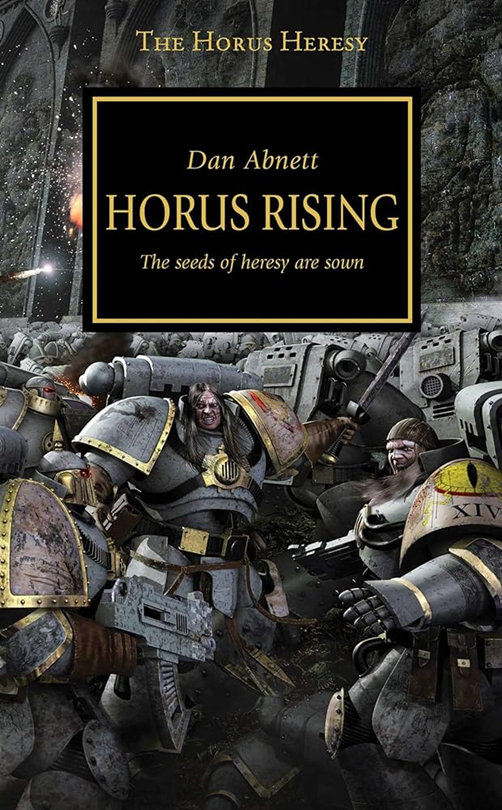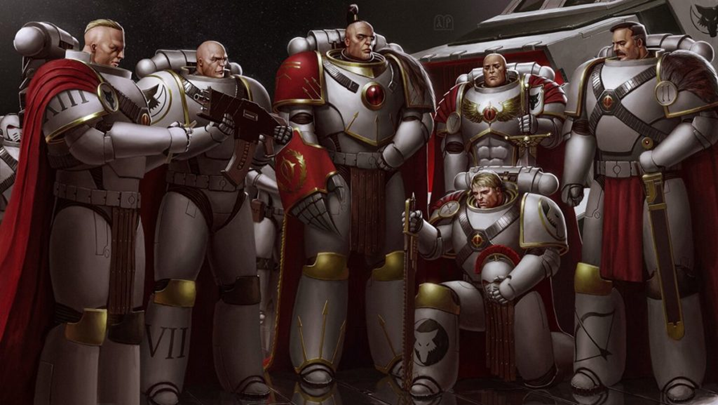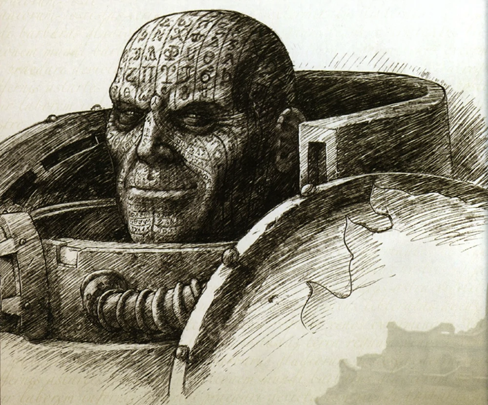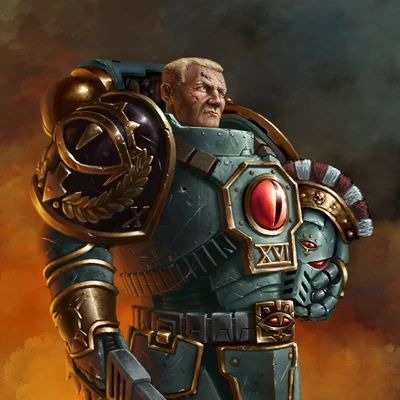
Welcome all, to the first book of my Warhammer 40k book club and our introduction to the Horus Heresy, Horus Rising! I wasn’t sure what to expect from Horus Rising to be honest, I’ve never read a book from the First Founding/31st Millennium time period. It’s very different from modern Warhammer 40k, containing a lot less of the religious zealotry and fascism that will come to define the Imperium of Man in the future. In fact, if it weren’t for the Space Marines, Primarchs and other core 40k concepts, it could almost be a regular science-fiction novel. On one hand, was a bit off putting, as I was expecting typical Warhammer 40k experience. On the other hand, the very purpose of this series is to watch the fall of an empire in the middle of its ascendancy, to experience the decay and destruction of something great. And to do that, Horus Rising has to first establish what exactly we’re losing.
Oh and for those of you looking for anime content, don’t worry. I have a few reviews I’m working on for the end of the season, and Wooper and I are working on our usual Season Preview to come out in a week or two, so those are on their way!
Important Characters
• Horus Lupercal, Primarch of the XVIth Legion
• Ezekyle Abaddon
• Euphrati Keeler, Remembrancer
• Mersadie Olitan, Remembrancer
• Erebus, First Captain of the Word Bearers
• Sanguinius Primarch of the IXth Legion
• Horus Aximand
• Tarik Torgaddon
• Kyril Sindermann
• Ignace Karkasy, Remembrancer
Horus? Where is he?
Kicking things off, I’d say what stood out to me the most about Horus Rising was just how little Horus Luperchal was actually in it. For a book named after him, he’s more of a tertiary character than anything else. He’s barely in any scenes, and when he does show up, we’re never inside his head. Instead, everything we learn about him comes from the perspectives of other characters, more often then not his Mournival, his closest advisors. This has the interesting effect of ensuring we never know the true Horus, his thoughts always remain a mystery to the reader just as they do the other characters. Is the geniality, charisma and humor he shows when with the Mournival genuine? Those around him seem to think so, and he is described as the best of the Primarchs, not only in a physical sense but emotional and charismatic ones as well. But we also know, from the very name of this series, that Horus is destined to fall. And Horus Rising establishes his skill at politics, his ability to play people and use others to create advantages, multiple times. So again, is this geniality genuine? Or just a facade? I suppose we’ll find out as we read more.
Moving on from Horus, we come to the real main character of Horus Rising: Garviel Loken, Captain of the 10th Company and newly minted member of the Mournival. Garviel might be the single most interesting and complex Space Marine character I’ve ever read. In modern 40k, most of them are zealots with all the personality of a brick. There are exceptions of course, like Dante or maybe Bjorn, but for the most part Space Marines tend to be rather one-note as characters. Yet in Horus Rising, Garviel is compassionate, spending the entire book expressing his feelings and doubts on… well everything. How can he best serve Horus? When is it better to seek a peaceful resolution to a conflict? Will this Grand Crusade ever end, or will the be fighting and defending this empire forever? What are daemons, spirits and magic, and have they been lied to about their existence? At his core, Garviel Loken is more human than most of the “brothers” he serves with. Thus as we learn about and experience the Imperium through him, we come to see not a gilded and perfect empire but the beginnings of a flawed, fascist tyranny, even if it hasn’t quite reached the depths it would by the 41st millennia.
Horus Rising did a great job with Loken, and with most of the characters in fact. It does a great job of setting up a cast bound by many conflicting loyalties. Loyalties to each other, to their Primarch, to their Emperor, and to the people of the Imperium they fight for. What happens when your Primarch turns against your Emperor? Or when you are ordered to murder fellow humans simply because they believe something different than you, despite how they had existed peacefully for millennia and would have continued to do so had you and your army not arrived? For now, none of these have really been challenged or pushed to a breaking point. But the conflicts have been established, and we know vaguely where this story is going to go. So the question becomes, who will break what oaths, for what reasons? Personally, I’m really looking forward to where Loken falls, because I could easily see him siding with… anybody depending on what happens.

Space Marines are Cool
Next up, I want to talk about how Horus Rising handles the Space Marines, the Astartes. I really enjoyed how… separated they felt from the normal humans. From their culture to their physiology, Astartes barely identified with their fellow man at all. They often acted above them, like they were superhuman, as if the thoughts, opinions and wellbeing of mere mortals were beneath them. In fact, a good portion of the book was just about Loken going from looking down on the remembrancers to understanding and championing their cause. It goes a long way in setting up why these men might turn traitor, might turn on an empire slowly being taken over and led by bureaucrats and lesser men rather than the warriors who conquered it in the first place.
This is further shown in the battles of Horus Rising, mostly between the men of Sixty Three Nineteen and the Megarachnid xenos. Not only do they not think or act like regular men, they don’t fight like them either. Charging through gunfire and artillery, taking blows that would kill a normal man and continuing on, walking over the corpses of the fallen and feeling nothing as their footsteps trail blood. The fights may not be described or written particularly well, if Dan Abnett has one weakness it’s his battles, but they certainly sell us on how these men are bred for war and little else. I’m looking forward to learning more about them and their variety of cultures as we are introduced to more and more of the Legions, as Horus Rising makes it clear that each one isn’t just its own military force, but almost it’s own nation or army in and of itself.

Sowing the Seeds of Chaos
Finally lets talk about something that only shows up in the last 3rd or so of the book, Magic. Or as Warhammer 40k calls it, Chaos. Chaos is a very common force in modern 40k novels, there are entire factions centered around it and its presence is felt all throughout the setting. In the 31st Millennium of the Horus Heresy however, it seems to be largely unknown due to the decrees of the Emperor outlawing all forms of religion or spirituality. The idea was clearly to try and bury the knowledge so that it would no longer be a threat. However no one knowing of it doesn’t make it go away, it only leaves them unprepared to handle it when it appears, as we see with Loken and Jubal in the Whisperheads.
I thought this was a good way to introduce Chaos to the story. Horus Rising starts by writing off and condemning all forms of spirituality and witchcraft, only to have it slowly seep into the story as an unnamed force, before finally explaining what it is and that the other civilized races of the galaxy have a name for it: Chaos. Not only does this introduce a corrupting force that the Emperor has clearly kept secret from his men, it also further justifies Horus’s growing distrust towards the Emperor and his edicts. Keeping secrets like this from your most loyal and prized sons? It becomes clear that the Heresy would most likely happen regardless of whether or not Chaos affected Horus at all. That it most likely will only speaks to its danger, and the threat it poses to the Imperium.
Lastly, we get to see how Chaos already has a foothold in the Astartes through Erebus. We don’t know a lot about Erebus yet, he’s generally presented as a level-headed, wise man who has been advising Horus for many months since he joined their fleet. Every member of the Mournival seems to appreciate his presence. But the final scene of him hiding away the blade he stole from the Interex, as well as the preceding conversation about Chaos between Loken and Mithras Tull, make it clear that he’s already been corrupted by it. The only questions then are what does he plan to do with the blade, and how far has this corruption spread? Is it just Erebus? Or is it the entire Word Bearers legion as well as their Primarch, Lorgar? Obviously time, and further books, will answer both of those questions. But I felt they were a good way to close out the novel and lead us into the next as the story continues.
Conclusion
So yeah, I rather enjoyed Horus Rising. There wasn’t really any overarching narrative, no rising or falling action or anything, it read more as 3 shorter stories going one after another than a single. That’s not bad though, because it still accomplished everything I was expecting of it. Horus is well established, as is his coming conflict with the Imperium of Man and his reasons for doing so. A proper supporting cast around him was created so we aren’t just following his coattails. And we’re given just enough about the setting to understand the way things are, but not so much as to feel overwhelmed and become disinterested. The book also felt well paced and generally well written, particularly Lokens thoughts and musing on philosophy as he questions everything he’s ever known. The only bit I found underwhelming were the battle scenes as I said above, but those tended to be short and never overstayed their welcome. All in all, Horus Rising is a great introduction to the world of Warhammer 40k and the heresy at large.
That brings me to our next novel! I will be reading False Gods by Graham McNeill next. See you when I’m done with it!

